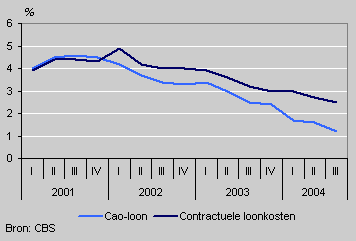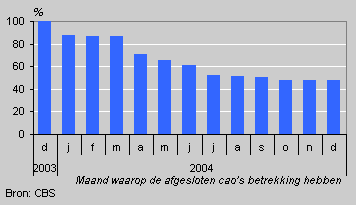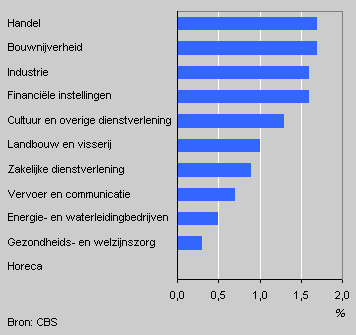Smaller increase in collectively agreed wages

In the third quarter of 2004 wage levels negotiated under collective labour agreements rose by 1.2 percent. In the second quarter the increase was still 1.6 percent. In the last three years wages rises have slowed down almost continually.
The increase in collectively negotiated wage levels was nearly the same as the rate of inflation, i.e. 1.1 percent. In 2003 the increase was 0.7 percent higher than inflation.
Larger fall in contractual wage costs
The contractual wage costs rose by 2.5 percent in the third quarter, more than double the increase in wages. In the second quarter contractual wage costs rose by 2.7 percent. This fall was smaller than that for wages because the basic premium for industrial disability insurance was raised by 0.4 percent.
Wages and contractual wage costs

Half of labour agreements negotiated
The provisional results for the third quarter of 2004 are based on just over half of all collective labour agreements. In recent months hardly any new collective negotiations have been completed. Since the failure of employers, unions and the government to reach agreement on early retirement, new labour negotiations have been more difficult.
Percentage of negotiated labour agreements, 30 September 2004

Large differences between sectors
There were substantial differences between the amounts of wage rises between the various sectors of industry. Construction and trade had the largest increase in the third quarter, with 1.7 percent. The construction sector also reported the largest wage rise in the second quarter of 2004. Manufacturing and financial services also had reasonably large wage rises.
Wage rise by sector of industry, third quarter 2004

The smallest rises were reported in the health care and welfare and the hotel and restaurant sectors. In health care and welfare the rise was 0.3 percent. In the hotel and restaurant sector wages did not rise at all.
Wage increase above zero
The above-mentioned results are based on collective labour agreements that have already been negotiated. If we assume that wage levels still to be agreed under the remaining agreements will not be raised, the wage increase in the third quarter would be 0.8 percent. This would be the lowest increase since 1984.
Although the 2003 autumn agreement between employers, trade unions and the government was based on a wage increase of nought percent, the wages under these agreements will rise in 2004. This is because agreements of 2003 and 2002 contained rises in 2004 for wages in these sectors.
Nathalie Peltzer